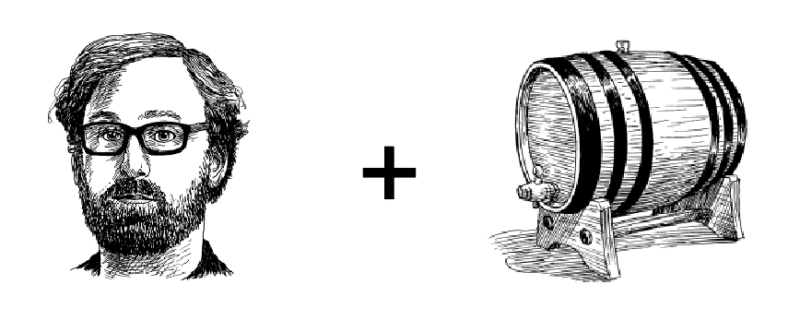Eric Wareheim is one of the great visionaries of comedy in the new millennium. Over the last sixteen years, he’s made several television shows, movies, and books that push the seedy outer limits of deadpan humor. Mostly working with his collaborator, Tim Heidecker, he sings, acts, and writes to construct a dark, disgusting, and distinctly American farce. He also costars in the Netflix show Master of None, and has directed intense, absurdist music videos for Charli XCX, Major Lazer, and Flying Lotus.
In the last few years, Wareheim has also stepped into the wine business. With winemaker Joel Burt, he started Las Jaras Wines, a company focused on low-intervention, light, affordable wines. Their most popular variety, Sweet Berry Wine, takes its name from The Tim and Eric Awesome Show, Great Job!, in which Dr. Steve Brule (played by John C. Reilly) greedily drinks a wine of the same name. Wareheim is serious about winemaking, but he also wants to rub against the industry’s snobbish, aristocratic reputation.
I spoke to Wareheim from Sonoma County, California, where I was living, not far from the Las Jaras winery. Recently, a series of fires had devastated the region, leveling homes, killing dozens of people, and ruining a large portion of the area’s fall harvest, including grapes. Las Jaras was not affected, but since the fires the winery has donated a portion of its sales to the recovery of California’s wine country.
—Ross Simonini
THE BELIEVER: Where does your wine come from?
ERIC WAREHEIM: The winery is in Sonoma County, but the grapes are from the Mendocino Mountains and Sonoma Mountain.
BLVR: What’s the beginning of the winemaking process?
EW: The beginning is a conversation that you have with your partners. For example, I have one partner, Joel Burt, and we talk about what kind of wines we want to make, how many cases we want to make—or, in our case, how many we can afford—and what style [we] want to make. And that sort of dictates where you go to buy the grapes, how soon you harvest them. You can harvest them early in the season or you can harvest them late in the season if you want a sweeter, kind of big-bodied fruit. We usually don’t do that. We usually harvest early in the season, because our wines are light, elegant, French-style, minimal-intervention wines that are made to be slammed with food, and not these heavy wines that are associated with California. We’d like to go back to the ’70s, when California was making very elegant, world-class wine, and then America kind of dipped into this shit world. Right now...
You have reached your article limit
Sign up for a digital subscription and continue reading all new issues, plus our entire archives, for just $1.50/month.
Already a subscriber? Sign in





